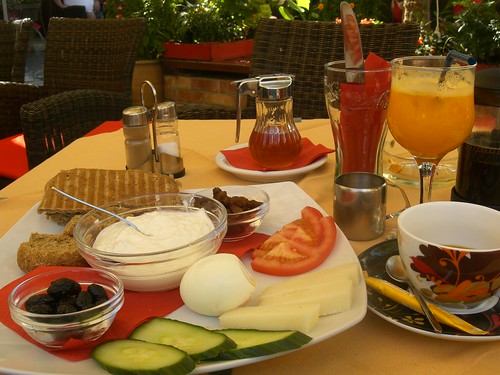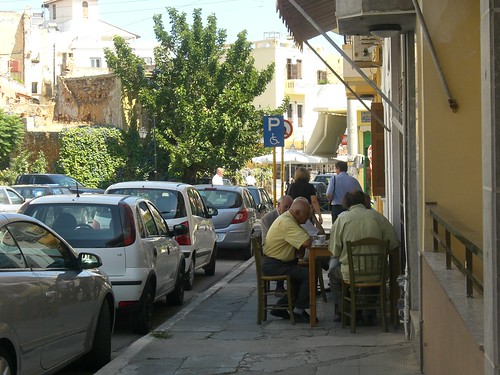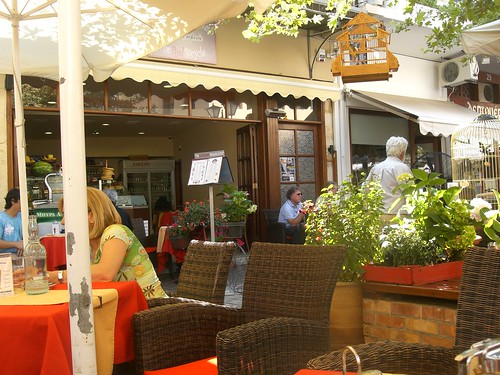Greece has never really had a breakfast culture. Most people will have a (usually) warm drink in the morning, or nothing at all. The kind of work people did in the past, coupled with the high rate of daily sunshine, must have contributed to this situation - working on a full stomach in a hot environment is never recommended. In recent times, street food has overtaken that sector of the food market.
If I have shopping to do before going to work, I pick up a koulouri to munch on at the office. Coffee is a personal affair for most people - I only like the one I make at home.
Greece was until only relatively recently an agriculturally based country. People got up early in the morning to get their chores done: tending fields and gardens, orchards and olive groves, and finally animals. It was important to get these daily chores done early in the morning, because once the sun rises, so does the temperature. After a late evening meal (common in Greece) and a good night's sleep, a hot cup of milky coffee or sweetened malotira (mountain tea) would suffice in the morning (with maybe a dry rusk or koulouraki for dunking) before starting out on those dusty, dirty, tiring chores. In the summer the day might start off at just after 6am and finish by 11am, as the sun would make it too hot to continue working. The farmer would then come home and have an early lunch (the main meal) around midday, rest and sleep off the siesta, and go back to the fields in the afternoon when the weather was cooler, if there remained any unfinished tasks. It may not sound like a lot of hours of work daily; just remember to calculate the weekly number on a daily basis, with no days off.
My family's breakfast choices; variety for everyone. Sometimes I get the feeling that my kids are the only ones who eat breakfast, judging by what I've seen other kids bring with them to school. I overheard a mother complaining that her children are going off their morning milk. My helpful nature suggested combining it with some cornflakes. A horrified look came over her face. "You give your children CORNFLAKES for BREAKFAST?" Since then, I've learnt to behave like a fly on the wall more often.
The urban population of Greece has always been used to split-day working hours. Most shop owners in Greece, for instance, still insist on morning-afternoon operating hours, breaking the day at midday: five hours in the morning (9-2), closed during the hottest times of the day (2-6), and another 3 hours in the afternoon (6-9), although there is no afternoon shift on Mondays, Wednesdays and Saturdays. Doctors' surgeries, lawyers' offices, and all manner of businesses run along these lines, despite a recent change in the law that allows all commercial enterprises the right to operate all day, between 8am-9pm. Greeks are very resistant to change (which probably explains why they continue to smoke in public places, despite the recent law banning it, and still talk on their mobile phones while driving without wearing seatbelts). With the economic crisis, there was a furore over Sunday trading hours during the Christmas period. Many shop owners defied the Sunday trading ban, and the public supported them, even in the driving rain. A few politically-associated protestors tried to close their shops; they are usually supporters of the communist or rainbow party ('nuff said).
Life has changed here in recent times, just as in any western country. People who have managed to survive the worldwide crisis facing the agricultural sector and are primarily still involved in agriculture will continue to get up early, but the changes in farming policies have caught up with Greece, and brought with them the commonly associated problems of the demise of the agricultural society. People are now more likely to work in the service sector, as clerks and other recognised professions, all associated with a specific workplace. There is also an increasing tendency for a more Western-style 9-5 working schedule in many internationally-styled offices and even in the public sector (offices are now open there till 4pm, instead of 2.30pm as in former times), but this isn't easy to apply for shop hours. Only supermarkets and multi-national companies are open all day without a break.
Although all societies have their own way to 'break the fast' every morning, it's most likely the case that breakfast in most traditional societies does not take place before one sets off to work, but most likely after some work has been done. The western fashion of eating a healthy breakfast before setting off to work is an idea that has developed in accordance with the idealised eight consecutive hours in a working day. Greece does not fit into the image of an ideal society, similarly with most traditional cultures steeped in ancient traditions. This won't be changing too quickly either. Breakfast at home still tends to be skipped by most people in such cultures. With the rapid rate of introduction of westernised work routines in such socieites, fast food centres do a roaring trade in coffees and snack food. The pace of life may have changed, but an appropriate change in dietary habits has not followed.
*** *** ***
I usually have a coffee in the morning and not much else before setting about on my daily tasks. the other day, I had some chores to get done in town, namely to buy a new modem for our computer and to see a notary public (συμβολαιογράφος - simvolaiografos) about getting a contract drawn up (lawyers don't do this, they just get you through the court system). I set off at just before 9am, the usual time most businesses open, in the hope of getting things done quickly and getting back home early. But this happens rarely in Greece. When you have face-to-face contact with the service sector, be prepared for long delays, queuing and partial completion of a task during different shifts in the day. Business life in Greece runs in a similar way to an old underground train system; you never know which part of the process will slow you down.The shop where I bought the modem from opened at 9am sharp, and I could buy the modem instantly, but due to work overload, the assistant couldn't set it up with my internet provider access codes until after midday. The notary public wasn't in her office at 9.30am when I arrived (nor did she have any sign on her door notifying customers of her office hours), and only her office phone number was listed on her name plate. I knew this was going to be a long day.
I could have gone shopping (and emptied my purse). I could have taken a stroll down to the harbour and had a coffee by the lighthouse, while admiring the mesmerising view (been there, done that). I could have gone home (and returned three hours later). I chose instead to have a leisurely sit-down 'breakfast', the kind that cafes serve to tourists. I have always wanted to do this; what stops me is the embarrassment of not being a tourist (these meals aren't cheap, either).

A Cretan breakfast is based on the Western idea of eating well in the morning, coupled with the desire for tourists to dine al fresco on something 'traditional'.
There is a small oasis of fresh cool air behind the cathedral of Hania where there are a few cafes based around a pedestrian zone. There were potted plants around the seating area and umbrellas providing extra shade. There was even an outdoor fan to cool down the overly humid but very relaxing atmosphere; it felt like being in the midst of cafe culture in Greenwich Village in New York (someone who's been there can verify this for me). The breakfast menu mentioned "full English" (the one with tinned baked beans), "continental" (the simple one with lots of bread and butter) and "Cretan". I was curious to see what would be brought to me in the latter.
The plate I was served reminded me of my favorite breakfast place in Hania: MAICh, which serves this kind of breakfast every morning (along with the westernised cornflakes and milk) to the foreign students studying there (their next meal is at 1.00pm). Remembering that Cretans do not really eat a breakfast of this kind (just like the English, who don't actually eat huge English breakfasts every morning), it's obvious that it was made up of the best that Crete has to offer at this time of year, using the prototype of a typical farmer's mid-morning snack after working in the fields: cheese, a boiled egg, tomato and cucumber slices, olives, rusks and brown toasted bread, yoghurt with honey and raisins (they skimped on the fresh fruit) with coffee (or tea) and a glass of orange juice (probably based on the idea of an English breakfast; it's not a traditional drinks combination in Greece - you usually have one or the other). And if you look around Hania near the more traditional men's coffee shops (kafeneia), you will see them munching on banana peppers, fresh cucumbers and olives while drinking their mid-morning raki (cucumbers are substituted by broad beans in spring).

Senior citizens enjoying a sunny day in the shade, close to the old Venetian port of Hania. These male meeting points (kafeneia) are dotted all over the town. They serve the cheapest coffees in town, and are also frequented by females and passersby.
After fortifying myself with this sumptuous buffet (I left the rusks and olives - it was too much to eat at one sitting), I went back to the notary public's office, and after waiting for 45 minutes reading all the magazines on her coffee table and hearing all the details she was including in her present customer's contract (in Greek, the word 'privacy' does not exist), I managed to get my job done (my patience greatly extended by this relaxing meal), picked up my modem and got home drenched in sweat. That breakfast made my day after all. I'm definitely doing this again, hopefully with company next time. And for a more traditional approach to a sit-down breakfast in Hania, don't forget to have a bougatsa if you come here.
Cretan breakfast at The Red Bicycle (Το Κόκκινο Ποδήλατο): 7.50 euro per person, with no time limit; try it for brunch.
* privacy - the Google translation tool provides the following translations: ιδιωτική ζωή (personal life), μοναξιά (loneliness), μυστικότητα (secretiveness), ησυχία (peace and quiet), ερημιά (deserted atmosphere). There really is no concept of 'privacy' in Greece in the way that it is understood in the English language.
©All Rights Reserved/Organically cooked. No part of this blog may be reproduced and/or copied by any means without prior consent from Maria Verivaki.



I was very pleased to find your blog. I lived in Greece for 15 years (12 in Athens, 3 in Kalamata) and now back in England I miss it a lot, so reading you and looking at the photos is a nostalgia trip. I put a link to you on my own blog.
ReplyDeleteMaria, you describe life in Greece as I had left it many years ago. Obviously, much hasn't changed with the public service sector! Nice that you got to enjoy a decent "brekky".
ReplyDeleteYou made a great choice in an otherwise frustrating situation! It's great that you were able to enjoy yourself and a little breakfast.
ReplyDeleteAnd as usual, I enjoyed my morning read:)
Too many Greeks skip brekkie or just have a coffee, smoke and maybe one of those gross apple croissants from the periptero.
ReplyDeleteI like toast, Greek honey, yogurt, fruits and coffee. Then...it's off to the beach!
This is what I call "the breakfast". :)
ReplyDeleteNot that I eat so much every morning, but I have developed this habit of eating a real nutritious meal before leaving. And I actually get up earlier in order to enjoy my breakfast slowly. In fact, it's become the most important meal of the day for me. :)
A nice relaxing breakfast is a great start to any day, but we can't always do that. Your meal looks so fresh and good!
ReplyDeleteIn past Greece had a breakfast culture.
ReplyDeleteF.e., mountain tea (malotira)or coffee was an indispensable part of Cretan breakfast. Along with it, fresh homemade cheese (myzithra)or graviera, olives, barley rusk served with olive oil and (in summer) tomatoes, watermelon and grapes.
In winter, soups such as hontros with milk (Crete) or trahanas soup (N. Greece) were a must in many regions.
The truth is that modern Greece doesn't have a breakfast culture. Coffee, a cookie, a few cigarettes and a snack later on... what a breakfast indeed!
Καλημέρα Μαρία,
ReplyDeleteΛοιπόν μέχρι τη δεκαεετία του 60 (πάνω κάτω), οι΄Κρητικοί αγρότες ξυπνούσαν με το ξημέρωμα και έπιναν μαλοτήρα (συχνά με μέλι), 1 κομμάτι παξιμάδι στο λάδι, ελιές, τυρί και το καλοκαίρι και φρούτο ή ντομάτες- ένα αρκετά δυναμωτικό πρωινό αν το σκεφτείς, που δε βαραίνει όμως το στομάχι. Το χειμώνα όταν έκανε πολύ κρύο έπιναν και λίγο ζεστό κρασί με πιπέρι ή κανέλα και ζάχαρη. Γύρω στις 10 έτρωγαν κάτι στο χωράφι (τυρί, ψωμί, ελιές κ.λ.π.) Στη Β. Ελλάδα έτρωγαν ένα πιάτο παπάρα (ή οπως αλλιως λεγεται κατα τοπους) από καλαμποκίσιο κυρίως ψωμί με γάλα και αλάτι, όχι ζάχαρη ή σούπα τραχανά. Και εκει΄όταν είχε πολυ κρυο πριν φυγουν για τα χωραφια επιναν κρασι με καυτερο κόκκινο πιπέρι.
Ανάλογα με την περιοχή άλλαζαν τα φαγώσιμα που καταναλώνονταν κάθε πρωί. Πάντως όταν επρόκειτο να λείψουν πολλές ώρες από το σπίτι, συνήθως οι κτηνοτρόφοι, δεν ήταν ασυνήθιστο να φάνε αντί για πρωινό κανονικό φαγητό.
So interesting information indeed!
ReplyDeleteOh, this is an absolutely beautiful blog !
ReplyDeleteThe photos, the writing, the food !
You make me want to be there ;)
I am an organic gardener in Hubbard, Ohio, USA and I found your blog by looking for other organically-minded folks.
Glad I found you :)
Organically Yours,
Diana
P.S. I am following your blog through mine here on Blogspot now and if you are on Twitter, look me up
http://twitter.com/Relax_Naturally
Hi Maria- that was fun, thanks. That place looks nice! There is a cafe right on Maiden Lane in San Francisco that sets their tables up in the street on sunny days. That one might be comparable. The thing I like about the Greek ones is they buy new furniture on a semi-regular basis. The coffee shops in Berkeley are kind of seedy and run down after a few years. They don't try to keep them up very well, for the most part. Happily, there are exceptions. If you make it over here some day the parea tou sifi will take you on your own personal tour.
ReplyDeleteBTW I started eating a light but healthy breakfast a few years ago and it has really helped me. I allow myself a morning pastry only on Saturdays--and we have good ones here! Take care.
No need for lunch after such a breakfast!
ReplyDeleteHa ha!! Loved the bit on privacy... We were just on our honeymoon in Greece and spent a month in the village. My husband couldn't understand the constant visiting and invitations and obligations to see people, frequently asking me if they understood the concept of "privacy"... : ) No, no they don't...
ReplyDelete